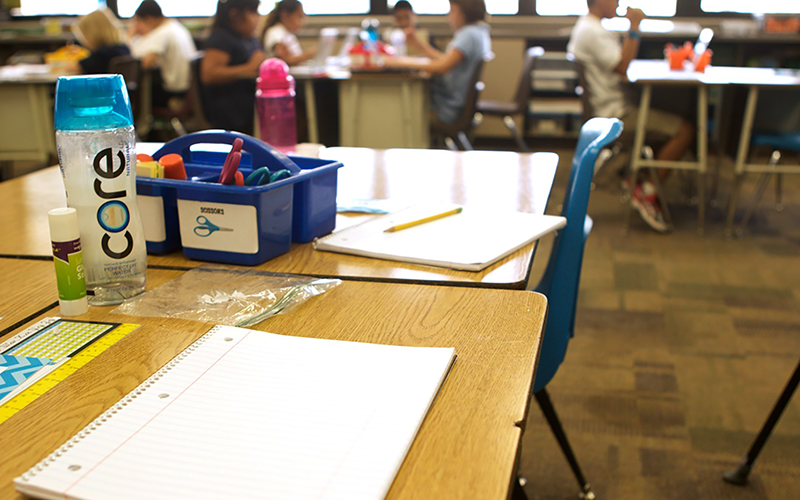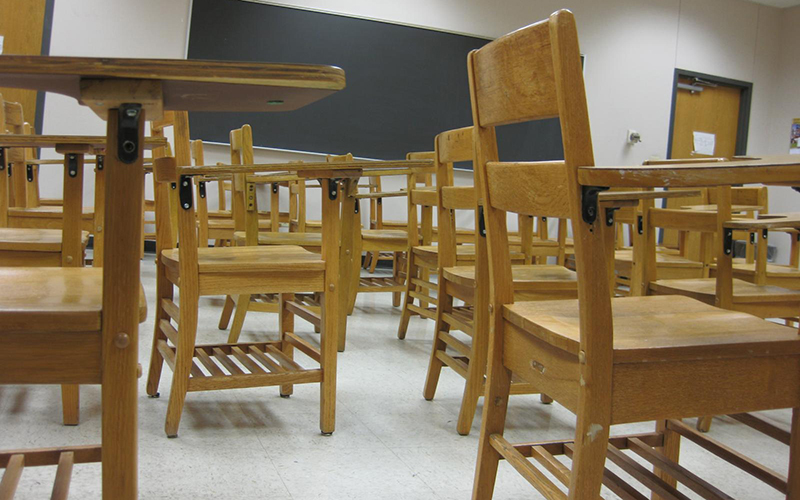
State Sen. Sylvia Allen, R-Snowflake, and state Rep. Michelle Udall, R-Mesa, say they support giving schools the authority to delay the start of in-person classes. (Cronkite News file photo)
PHOENIX – Gov. Doug Ducey’s order delaying the start of the fall school year was a disappointment to fellow Republican Sylvia Allen, who chairs the Senate Education Committee.
The governor’s announcement came on the heels of his office’s release of millions of dollars to help schools reopen this fall. The fact that the order came from the governor, and not a vote by the Legislature, has raised questions for some state lawmakers.
In an email to Cronkite News, the conservative Republican from Snowflake said Arizona should not be governed through executive orders, noting that “the legislative branch makes policy and budget allocations, not the executive branch.”
“It is time to stop, call a special session, and get back to the constitutional operations of our state,” Allen said.
Rep. Michelle Udall, R-Mesa, chairwoman of the House Education Committee, doubts that a special legislative session is feasible, and she worries how many legislators would actually show up because of COVID-19 concerns and obligations to family members who may be sick or at risk.
“Calling a special session would end up with a bunch of people running in different directions, which is not going to help,” Udall said. “I don’t think we have enough consensus to get anything done.”
Despite such reservations, Udall said, she “would love” to hold a special session to address education issues in the state – under different circumstances.
However, she and Allen both support giving schools the authority to delay the start of in-person classes. Allen said she recently worked on her own legislation that would have provided, among other items, “local control and flexibility for schools opening and determination of health protocols.”
The governor’s delay of the school year was part of his June 29 executive order that also shut down the state’s bars, gyms, water parks, movie theaters and river tubing for 30 days.
This came after Ducey, in an order June 24, distributed $270 million to help schools reopen safely this fall, including money to protect districts against budget shortfalls, improve distance learning and expand broadband in rural communities.
Gabriel Trujillo, superintendent of Tucson Unified School District, said he had hoped the state also would have equalized payments for online and in-person students, and give districts greater flexibility to “explore options to delay the start of the school year.” But overall, he said, “the governor, to his credit, has done everything that he can do.”
Trujillo said funding formulas and school year start times are “in the hands of the Legislature.”
Regardless of who sets state policy, whether the governor or the Legislature, any changes will affect school districts, said Erin Hart, the chief operation officer for the education advocacy group Expect More Arizona. Each piece of new information that makes it to schools is a “sigh of relief” for administrators, who then can shift attention elsewhere.
“They can focus on other parts of their plans that they are still developing,” Hart said.
After the governor’s delay to the the fall school year until Aug. 17, one school district Cronkite News has reported on in the past —the Creighton School District — told the parents of its 6,000 or so students to still expect “enhanced, structured remote learning” on the original start date of Aug. 3, with remote learning continuing until in-person classes can begin Aug. 17 – or whenever the governor announces in-person learning can resume. Despite the governor’s delay, some Arizona parents and teachers worry schools still won’t be able to safely accommodate the return of students to in-person classes this fall.
The district also gave families three choices for the fall school year: full remote learning, the ability to transition from remote learning to in-person classes at predetermined dates throughout the year, and attending in-person classes every day. The district has not set a deadline for parents to select the option that’s best for them.
This direction comes after the Arizona Department of Education’s road map for reopening offers districts many possible options, including a mix of online and in person classes. Part of the framework includes social distancing, wearing face masks and screening students as they enter schools. Schools across Arizona are currently grappling with how to pay for these and other new additions to district procedures.
However, even more funding issues loom for Arizona schools. As classes went online after the state ordered schools to close March 16, legislators allowed the same state funding for online students as those who attended school in-person. Mesa legislator Udall said the governor, under an emergency declaration, can continue to use federal Coronavirus Aid, Relief, and Economic Security Act dollars to make up for the state’s difference in online and in-person student funding. However, there has not been a permanent change to state education funding that equalizes online and in-person funding.
The Department of Education didn’t respond to repeated requests for comment for this story.
In a June 12 email, department spokesperson Morgan Dick said that the “guidelines presented in the roadmap are a series of suggestions and are not mandates for schools,” and that the department is continuing “to work with Governor Ducey and his team, as well as the Legislature to ensure that schools have all the tools they need to safely reopen the brick and mortar facilities next school year.”

